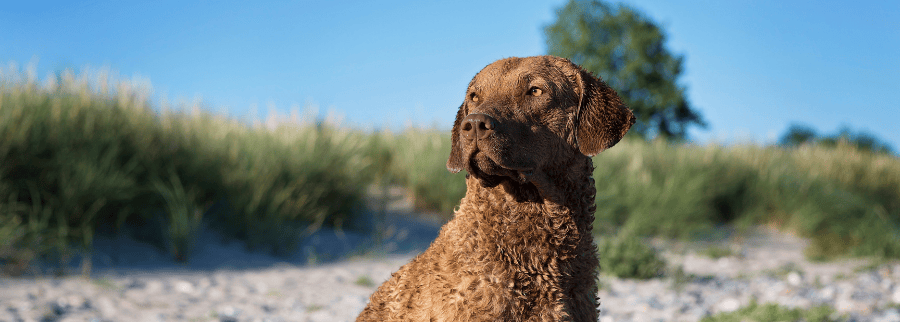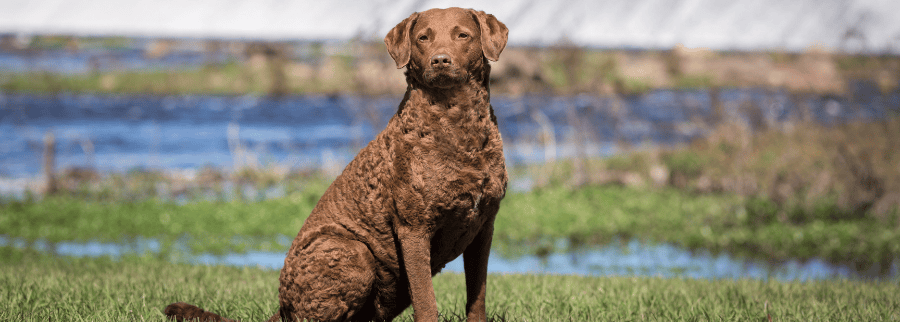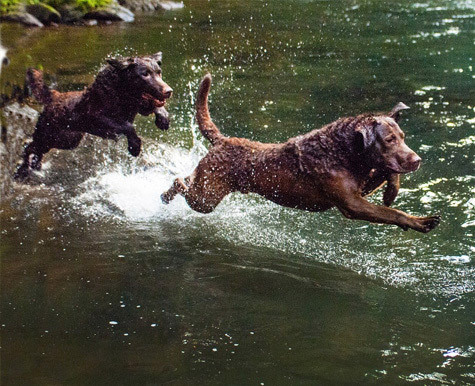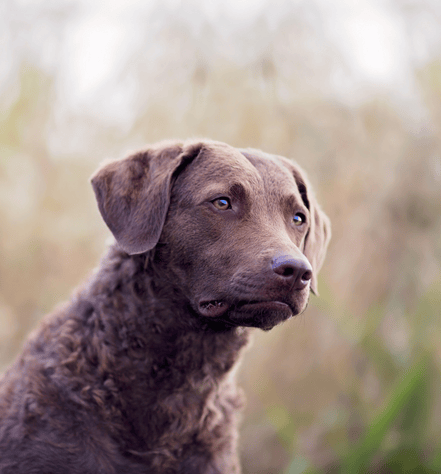






Chesapeake Bay Retriever
 Overview
Overview
What dog takes to water like nobody's business, is the state dog of Maryland and will even dive into icy waters? The Chesapeake Bay Retriever, that's who! Built to withstand the brutally cold, rough waters of the Eastern Seaboard, like the Chesapeake Bay area, these tenacious dogs are champions when it comes to hunting and retrieving waterfowl. Their broad, powerful chest helps them break through the ice, so when it comes to swimming and hunting, nothing will stand in their way. The breed origin dates back to 1807 when a ship was saved off the coastline of Maryland when a distress call was sent out. Among the passengers on board was a pair of Newfoundland dogs that happened to be good retriever gundogs. Later on, the rescued pair were crossed with several different breeds, including the Golden Retriever. The resulting puppies were named Chesapeake Bay Retrievers in honor of where the parents were saved from. Chessies come in brown, tan, sedge, and dead grass. Their coat, lip, and eye color come together in a stylish monochromatic palette which gives them style as well as an upper paw when it comes to blending into their hunting grounds.
Common Health Conditions & Recommendations for
Progressive Retinal Atrophy (PRA):
Like many breeds, Chessies can inherit a range of eye issues like progressive retinal atrophy. If left untreated, these kinds of degenerative eye conditions can lead to blindness.
Recommendations for Progressive Retinal Atrophy (PRA) in :
Common Health Conditions & Recommendations for
Hip Dysplasia:
is an inherited issue that is especially common in larger dogs, like the Chesapeake Bay Retriever. In dogs with hip dysplasia, the ball and socket may not develop properly, causing friction and deterioration over time and possible.
Recommendations for Hip Dysplasia in :
Common Health Conditions & Recommendations for
Von Willebrand’s Disease:
is a bleeding disorder that may be inherited by Chesapeake Bay Retrievers. This is a condition that decreases blood clotting ability so if they get injured, they may bleed excessively or develop a secondary issue like anemia
Recommendations for Von Willebrand’s Disease in :
 Chesapeake Bay Retriever Personality
Chesapeake Bay Retriever Personality

Chesapeake Bay Retrievers or Chessies, as they are fondly referred to, are often mistaken for Labrador Retrievers, but the similarities end there. The personalities of both breeds are radically different. Likened to the Sherman tank of the retriever world, these large sporting pooches (55-80 lbs) are especially wary of strangers, so early socialization is essential. Chessies are super-smart and hardworking, so they require a lot of daily exercise and stimulation. Their waterproof coat is pretty easy to maintain - a weekly brushing should do the trick! Chesapeake Bay Retrievers would be a perfect fit for a hands-on type of owner, especially one that does activities in the water! However, their exercise demands and need for strong leadership may be challenging for novice owners. These pooches would be happiest in the countryside or away from the city where they can really stretch their legs. So if you want a powerful, water-loving companion who will work for hours come rain or ice, get a Chesapeake Bay Retriever!



 USD
USD
 Canadian Dollars
Canadian Dollars


